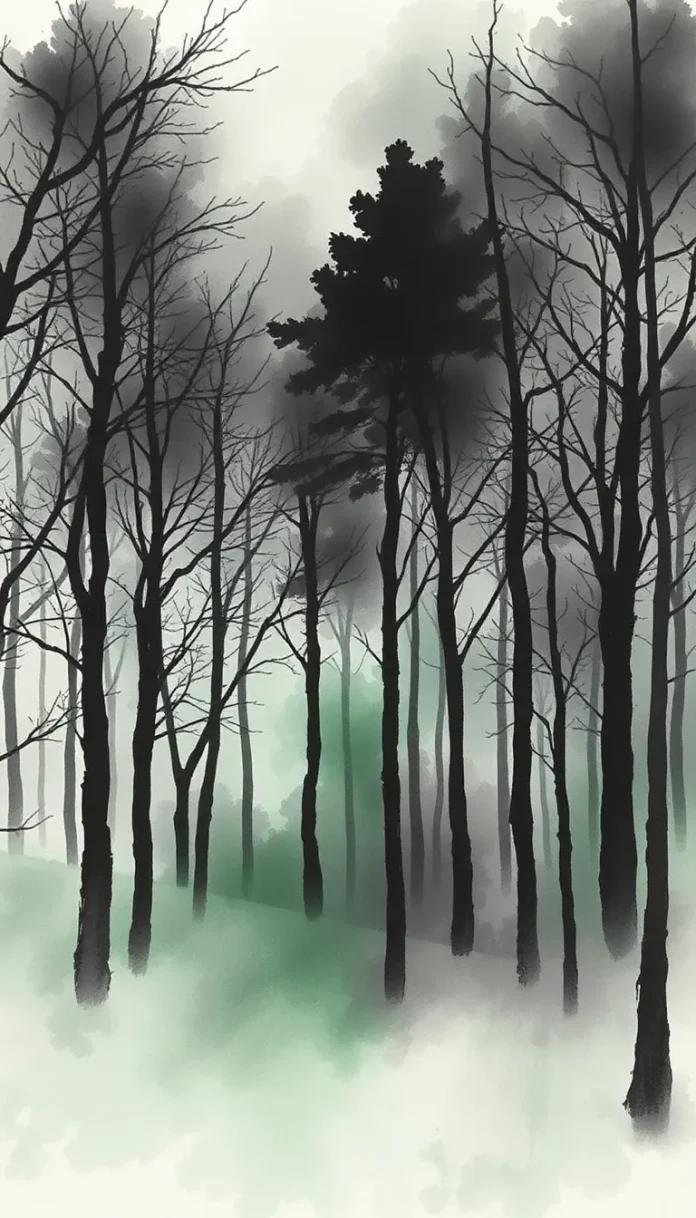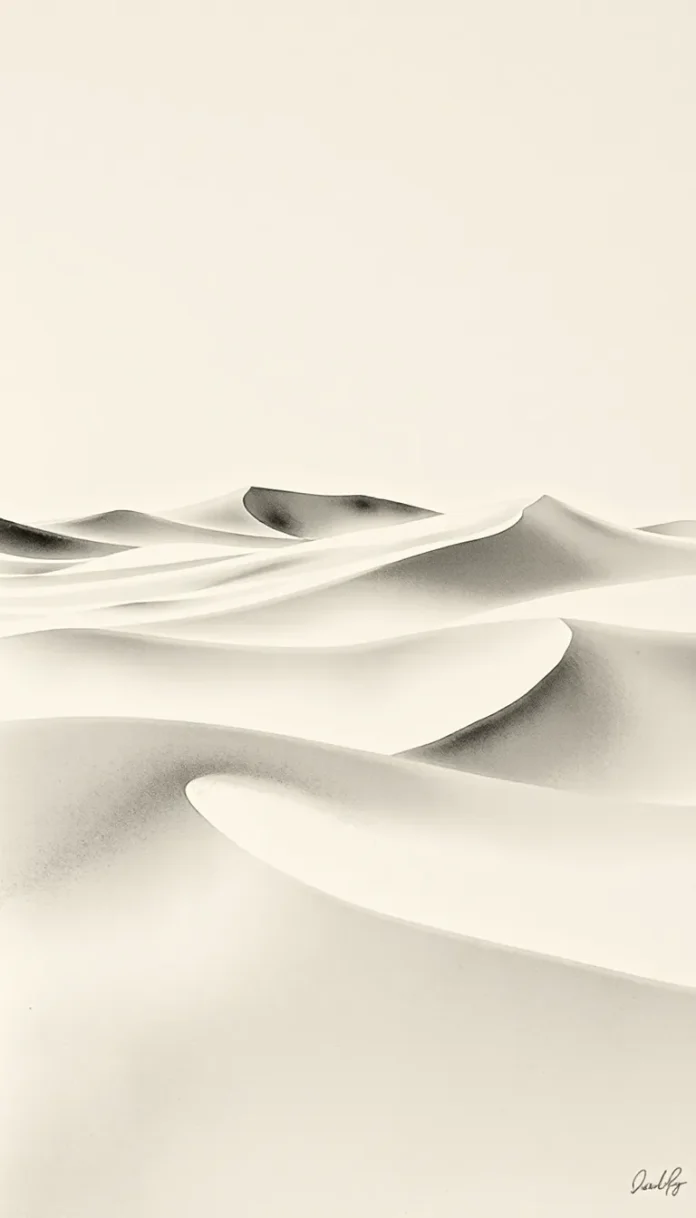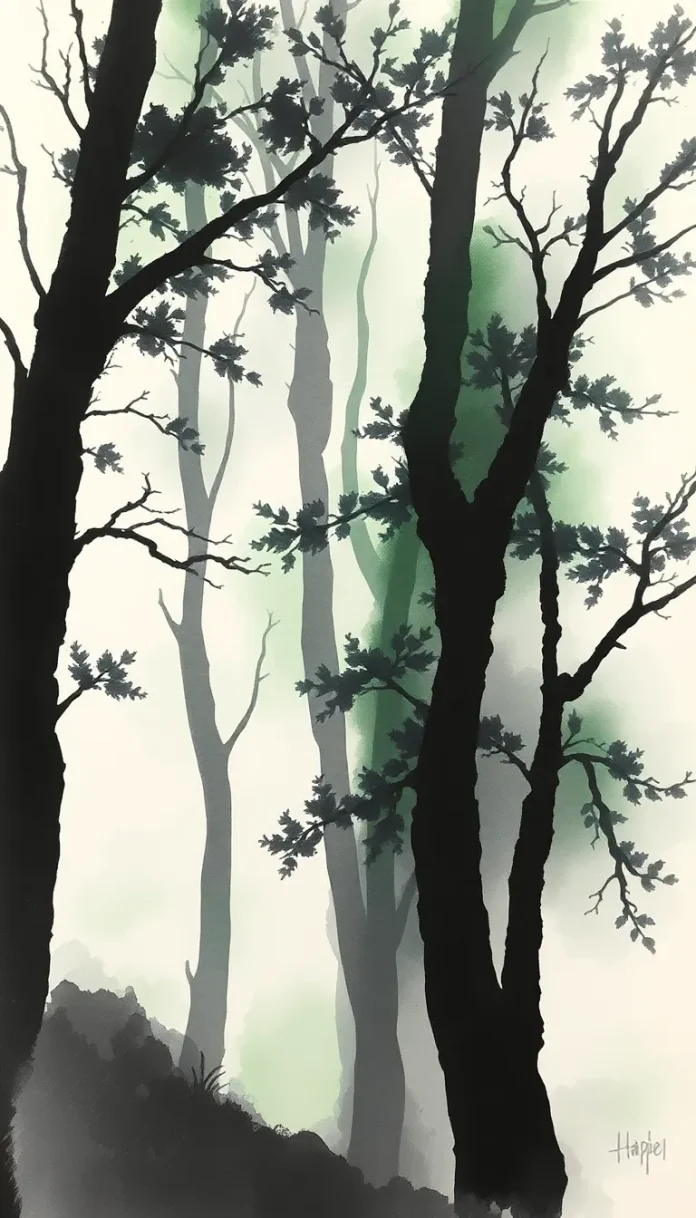The Autumn Reverie
Beneath a canopy of amber and russet leaves, the old man rested, his countenance drawn with a measured melancholy as he listened to the murmurs of the wind, like a stream of whispered recollections carried far beyond the realm of mortal markings. Each falling leaf was a page from a forgotten diary, each gentle gust a stanza of a ballad unsung. In this realm of nature’s slow decay, his soul stirred with memories of youth, of love missed and moments cherished, a timeless gallery of yesteryears etched upon the inner corridors of his mind.
I.
In the crisp embrace of that autumnal day, time itself seemed to yield beneath the weight of reminiscence. The Observateur, whose eyes mirrored the depths of endless skies and whose heart harbored secrets of forgotten felicities, recalled with an aching clarity the vibrant days of his long-past youth. “Ah, what erstwhile splendor,” he murmured to no one in particular, his voice scarcely above a wisp of the breeze, “when every breath was an ode to a world yet unburdened by sadness.”
He cast his glance upon the rippling surface of a nearby pond, wherein reflected was the spectral visage of a bygone era—a time when his spirit had been as untrammeled as the silver gleam of water beneath a full moon. Here, in the interstices of now and then, his soul recollected the face of a dear friend, a confidante whose laughter had resounded like a chime in the corridors of his being. Though names and dates had blurred under the mists of time, the delight of those moments survived, glimmering like scattered jewels across the landscape of his fading recollection.
II.
The bench, aged by seasons and scratched with the insignia of countless passers-by, preserved its own silent narrative. In its wood were etched the echoes of conversations past, the murmuring confidences of strangers who had found solace within the transient haven of the park. The old man conversed in soft soliloquies with these unseen companions, his inner voice intertwining with the rustling leaves.
“Once,” he recalled as he gazed into the distance, “I walked these paths with fervor, my heart aflame with dreams that soared higher than the branches above. I spoke of hopes unspoken, of destinies unwritten, and yet, in that fervent burst of life, I never knew the quiet penance of time.” His tone, reflective and tender, carried the cadence of an elegiac sonnet. In that moment, his dialogue with the silence was as profound as the conversations of the soul—a contrast between youthful aspiration and the inevitable, languid passage of time.
A distant voice, almost a whisper from within the winds of memory, echoed as if in dialogue with the past: “Do you remember, dear friend, the golden fields of summer, the laughter that each fresh dawn would bring?” The silent air answered him with the rustle of dry leaves, a gentle affirmation of the yearning for eternal moments once lived with abandon.
III.
Thus began a journey of recollection, where every step down the winding path in the park was marked by memories long sealed in the vault of his heart. In the interplay of light and shadow, between the shafts of autumn sun and the quiet gloom of overhanging boughs, the Observateur experienced a revival of all things cherished and mourned.
With each step, he traversed a corridor of recollections; the ancient oak trees became venerable witnesses to his past, their gnarled forms bristling with the legacy of countless autumns before. He recalled how, in his youth, he and a dear companion—whose name now only existed in the cryptic passages of his mind—had carved their initials into the bark of a mighty oak, a timeless testament to friendship and shared dreams. The memory stirred his spirit, and a faint smile danced upon his lips. “Time encloses us in its eternal scroll,” he mused, his internal monologue a cascade of reflections as transient as the falling foliage.
IV.
In the interplay of ephemeral images, the park transformed into a stage where memory and nature entwined in a panegyric of life itself. As the day wore on and the shadows grew deeper, the man’s silent vigil became a meditation on the vicissitudes of existence—on the relentless, yet tender recycling of life into memory.
A warm gust carried the scent of distant rain, an evocative reminder of seasons past. In that scented air, he recalled the echo of laughter shared on rain-soaked afternoons, the playful banter of youthful hearts meeting in shared solitude. Soon, the melancholy of the present clashed unbidden with the exuberance of that distant time, creating a chiaroscuro of emotions that each gently layered upon the other. In the solitude of his reflection, he listened to the dialogue of his inner self: words of regret intertwined with joyful affirmations—a rich tapestry woven from the threads of paradox and harmony.
“Time, oh elusive architect,” he whispered in a quiet soliloquy, “you build monuments of memory from the rubble of lost moments, and in each silent structure I see the face of both joy and sorrow.” His words, like autumn’s own gentle lament, stirred a dialogue with the park’s soul, as if the earth itself spoke back in rustles and sighs.
V.
Before him, a narrow pathway beckoned—an avenue flanked by fading blooms and scattered leaves that glowed like vestiges of a luminous past. With measured steps, he ventured forth, his senses attuned to every delicate nuance of the autumnal symphony. The crunch of leaves underfoot resonated as the heartbeat of seasons long past; each step was a reminder of journeys once embarked upon and paths that diverged into realms unknown.
He paused by a modest marble bench where an inscription, worn yet enduring, recounted tales of ephemeral dreams and infinite time. In this modest iteration of art and nostalgia, he found solace and a reminder of how the simplest things bore the weight of the most profound truths. With his hand lightly grazing the inscription, he conjured the image of a younger version of himself—vibrant, full of promise, and yet so unaware of the intricate interplays of fate and memory.
For a while, a dialogue ensued—a quiet soliloquy that resonated with the cadence of half-remembered verses. “Is it not wondrous, the way in which time weaves its tapestry?” he murmured, reflecting silently, “each thread entangled with moments of rapture and regret, never wholly severed, yet ever shifting in hue.” Such internal musings, pure and unadorned, lent testament to a life not wasted but rather expended in a relentless quest to understand the impermanence of all things.
VI.
Beneath the boughs of an ancient elm, he encountered a young wanderer, whose eyes shone with a luminous, unburdened hope—a stark contrast to his own tempered reminiscence. The youth, pausing in his ambulation, regarded the elderly man with a quiet, respectful curiosity. Their encounter, brief yet ineffably significant, was marked by the inherent dialogue between the old and the new. The quiet nod of acknowledgment passed between them, an exchange wordless yet profound.
In a measured tone, the elder spoke, “Young traveler, do you ever pause to wonder at the evanescent beauty of the moment? For each leaf that drifts to the ground murmurs the secret of what has been and what may yet come.” The youth, his gaze steady and filled with fervent admiration, replied softly, “I have but begun to learn its language. Every step, every breath, feels like an invitation to discover the wisdom that lingers in the whisper of the wind.” Their words mingled in the crisp air—a dialogue of souls separated by age yet united by the common thread of seeking.
The observations shared in that transient conversation resonated deeply within the older man. It rekindled in him the embers of youthful wonder; for though memory was laden with nostalgia, there spent an opportunity to glimpse the eternal spring of inquiries that life perpetually presented.
VII.
As the twilight deepened and the gossamer veil of dusk embraced the park, the Observateur found himself meditating upon the inexorable march of time. A celestial dome, gradually bleached by the incipient luminescence of stars, served as a silent witness to his internal soliloquies. “In the gentle unfolding of night, I see the silhouette of destiny,” he mused in hushed tones. “It is as though the heavens themselves, infinite and mute, converse with the earth in cryptic parables of existence.”
He recalled the soft cadence of evening hymns—songs of the night that carried the fragrance of faded summer and the promise of midnight revelations. His heart ached with the realization that while seasons change and memories assail with both joy and sorrow, one constant remained: the eternal quest for truth, for meaning, for the knowing of one’s self amidst the undulating currents of fate. The old man’s internal monologue spun a lattice of introspection, framed by the interplay of light and shadow that defined a life lived in quiet reverence.
“Perhaps,” he contemplated, “it is not the finality of an ending that defines us but the journey of countless beginnings, each interwoven with the filament of memory. And in that journey lies our true visage, shaped by reveries and the silent dialogues that echo through ages past.” His voice, soft as a sigh of the wind, resonated with the ineffable pain and beauty of lived experience.
VIII.
In the later hours of the day, as the park hummed with the subtle magic of autumn nightfall, the silence grew more profound. The Observateur’s gaze wandered to a passage where the interplay of moonlight and shadow painted enigmatic portraits on the ground. Here, amid the interplay of earthly remnants and celestial secrets, he encountered a small, solitary fountain—a modest cascade of water, its filigree of droplets catching the glint of the moon as if each was a tiny beacon of memory.
Stirred by its gentle, constant flow, he sat once more by this murmuring water, letting his inner thoughts cascade as freely as the rivulets. “Do you perceive, dear fountain,” he spoke softly, addressing nature as one might an old friend, “how you echo the unfathomable depth of time? Like the ceaseless flow of life itself, you pour forth with neither expectation nor regret. You remind me, even in this twilight of reflection, that there lies beauty in change, in decay, and ultimately, in the persistence of memory.”
The water seemed to answer in its own language—a quiet, rhythmic cadence that spoke of cycles, of endings and beginnings intertwined. Its soft murmur was an echo of a promise: that every ending harboured within it the seed of a new quest, of another story yet to be inscribed upon the delicate parchment of existence.
IX.
Reinvigorated by this communion with nature, the Observateur contemplated his place within the grand mosaic of time. The themes of memory and nostalgia, so pervasive in his reverie, were not mere relics of a past lost; rather, they were living testimonies to the beauty of being, the complexity of human emotion, and the perpetual dialogue between the known and the unknowable. His silent quest to archive the transient moments had led him to a deeper understanding: that memory is a realm where joy and sorrow coexist in a delicate equilibrium, each giving meaning to the other.
In a gentle inner dialogue that traversed the boundaries of reason and reverie, he pondered aloud, “Is it possible that my past is not a chain that binds me, but rather a constellation by which I navigate the vast, enigmatic sea of existence? For in every cherished memory, there glimmers a spark of continuity—a luminous trail left by moments that refuse to fade in the passage of time.”
The park, in its quiet magnificence, listened with patient compassion. Even the ancient trees seemed to lean closer, their branches a tender embrace around his solitary figure. They bore silent witness to the truth of his meditations: that every life, steeped in the ink of both nostalgia and hope, was as much a part of nature’s eternal narrative as the delicate interplay of autumn leaves and shadowed paths.
X.
In that moment of introspection, as the last vestiges of daylight surrendered gracefully to the majesty of night, the Observateur remained poised between the worlds of remembrance and expectancy. His thoughts, as fluid as the waters of the humble fountain, gradually gave rise to contemplations of the future—an open, uncharted horizon where every whisper of memory might serve as guidance, every faded smile a beacon for what lay ahead.
“Time,” he intoned softly to the encroaching darkness, “is an infinite prose that continues to write itself with our every step, our every heartbeat. I stand as but one verse in its ceaseless song, a verse echoing with the strains of melancholy and the exquisite pain of remembrance. Even as I gaze upon the shadows that stretch into oblivion, I am filled with a quiet conviction that each moment bears within it the secret promise of yet another beginning.”
XI.
As the observer sat in contemplative silence, a final gentle interlude occurred in the form of a passing carriage, its soft clatter over cobblestones drawing his eyes and igniting within him an intermingling of nostalgia and newfound wonder. For in that fleeting sight, he saw the embodiment of life’s perennial cycle—a reminder that no ending is ever absolute, for even as one chapter folds gracefully into the embrace of night, another is destined to rise with the first blush of dawn.
In a measured cadence, his inner voice articulated, “What is this life if not a series of open doorways, where each threshold we cross unveils mysteries yet unspoken? We are but travelers on a boundless road, our paths interlaced with moments that both burden and liberate, with memories that are as haunting as they are hallowed.”
XII.
Thus, beneath the vast and ever-changing firmament, the old man embraced his state of perpetual passage—a traveler not resigned to solitude nor bound by the rigidity of bygone days. His spirit, imbued with the gentle luminescence of recollection, prepared to set forth once more, as if in silent communion with the eternal interplay of memory and hope.
The park, a realm of golden and shadowed promises, provided the setting for his inner narrative—a narrative replete with metaphors of falling leaves, murmuring winds, and reflections in water. Each element was a delicate allegory, urging him to witness the splendor of a world in flux, to accept the bittersweet cadence of existence without the need for finality.
In a final, resonant soliloquy that mingled the bittersweet scents of nostalgia with the tender hope of an unwritten tomorrow, he whispered, “Let the chapters of my past be the gentle lullaby that guides me forward; let each memory be a stepping stone, arranged in the mosaic of time, leading me through the corridors of today and into the uncharted realms of destiny.”
And as the murmur of the fountain and the rustling of leaves accompanied his final words, a quiet exchange seemed to pass between the man and the wind—a dialogue of the ages that spoke of life’s eternal openness. The journey was far from complete; the narrative of his existence remained unwritten in its entirety, a story that was destined to persist in the soft interplay between memory and future, between the certainty of nostalgia and the call of an uncertain horizon.
Thus, in the embrace of the autumn dusk, the Observateur silencieux du temps—an emblem of human fragility and enduring hope—rose quietly from his bench. With each careful step, he walked further along the path that was both a farewell to what was and an invitation to the myriad possibilities that lay ahead. His gaze was fixed not solely on the faded remnants of yesterday, but on the luminescent promise of an as-yet unrevealed morrow. His heart remained a repository of memories, each one a silent beacon in the mosaic of existence, urging him to continue the eternal journey.
In that lingering moment, as the night deepened and the soft cadence of nature enveloped him, one truth became clear: every life is an endless verse composed in the language of time—a narrative as open and unfathomable as the starlit sky. With the autumn wind as his guide and memories as his steadfast companions, the old man ventured forth into the shadowed mysteries of the night, his story forever an open question, eternally poised between the realms of now and nevermore.
And so, beneath the vast continuum of time and memory, the tale of an old man on an autumn bench remained a poignant reminder of the beauty inherent in the fleeting moments of life—a narrative not confined to endings but destined to live on, whispered on the winds of eternity, as an open hymn in the endless dialogue of existence.


